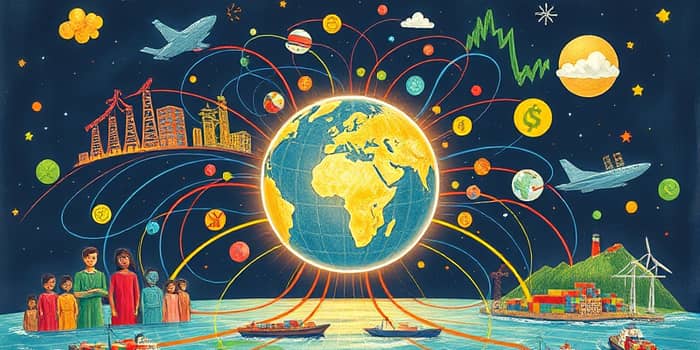
Every choice we make with our money sends waves far beyond our own bank account. In an era of slowing global growth and mounting uncertainty, understanding these ripples can help us become smarter, more responsible financial stewards.
Unprecedented trade policy volatility has moved from boardrooms to kitchen tables. When governments impose tariffs or renegotiate agreements, the cost of everyday goods can rise, squeezing household budgets and reshaping consumer behavior.
Key trade metrics reveal clear shifts that affect everything from the price of electronics to food staples. As companies adopt a “China plus one” strategy, supply chains are being redesigned, and this transition can create both price hikes and new local jobs.
Interest rates stand at their highest levels since 2007, and higher mortgage payments strain household budgets. For prospective homeowners, the dream of a first home becomes more expensive with each percentage point increase.
Credit cards and auto loans now carry heavier interest burdens, leading many families to prioritize debt repayment over discretionary spending. Businesses, too, are pausing expansion plans while they await a more favorable rate environment.
While some economies struggle, others are on the rise. Southeast Asia is emerging as a hub for production and investment, thanks to trade diverted from China and competitive labor markets.
Manufacturers are shifting supply chains toward Vietnam, Thailand, and Malaysia, creating new employment corridors and elevating local purchasing power. Even Mexico is gaining attention, though it faces tariff retaliation risks.
Rising debt levels in low-income countries pose a risk that extends to global markets. More than half of these nations are in or near debt distress, forcing governments to divert budgets toward servicing loans instead of social programs.
When financial institutions deem these investments too risky, capital flows retreat to advanced economies, potentially triggering market corrections that affect retirement portfolios worldwide.
Different central banks are charting distinct paths. The European Central Bank is easing policy while the Federal Reserve holds rates steady until 2026. This divergence influences global capital flows and currency values.
Investors must monitor rate differentials to manage currency risk and identify yield opportunities in international bonds and emerging market equities.
Amid uncertainty, individuals can take concrete actions to ensure their financial decisions contribute positively to the broader economy and their own peace of mind.
Our collective financial decisions shape the world’s economic trajectory. By staying informed and practicing mindful spending and investing, we can help foster resilience in communities near and far.
Whether through everyday purchases, home loans, or retirement planning, each choice echoes across borders. Embracing our role in this interconnected system empowers us to drive positive change and build a more stable, inclusive future.
References





